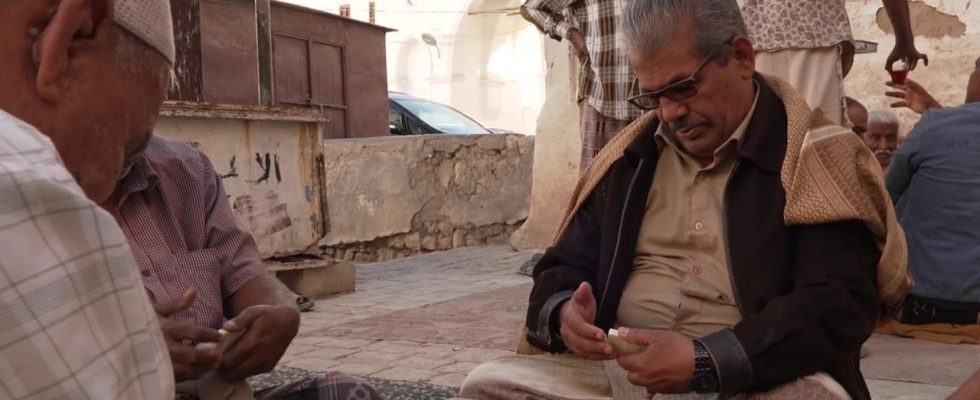report
In the south of Yemen, many are hostile to the Houthis. But they often view their attacks in the Red Sea positively. Does the conflict bring the civil war-torn country together?
The sun is low. It is afternoon in the Yemeni city of Shibam, 4 p.m. The light makes the beige and white high-rise buildings shine. Skyscrapers made of clay, built close together, rise majestically towards the sky. In the shadow of the spectacular skyline, children play football in the sand. The scene appears peaceful – the war that has been going on in Yemen for nine years seems for a moment to be very far away.
A large flag blows in the wind in front of the city gate: red, white and black, plus a light blue triangle with a red star. It is the South Yemeni flag. A sign that some militant groups in power in Shibam would like to secede from the north of the country, the area that the insurgent Houthis control.
Mohammed Faisal complains that tourists no longer come to Shibam.
Shibam is located in Hadramaut, a region where people have been hostile to the Houthis for years. But these days, some are rethinking their stance, including Mohammed Faisal. He is a tourist guide and moans. Because of the war, hardly any foreign tourists visited the narrow streets of the UNESCO World Heritage Site, he complains: “The situation is devastating, the families have suffered extremely since the beginning of the war. And there is a lack of money to renovate our houses.”
Imam preaches perseverance to the Houthis
500 kilometers further west is the old town of Sanaa, also a world heritage site. The Houthis have ruled there since 2014. Hassan Abdallah sits in a small mosque in the capital. He is a supporter of the Houthis and considers himself one of the Zaidis, a Shiite group with its own theological teachings. The visitors to the mosque respect Abdallah and call him Sheikh.
Hassan Abdallah is an outspoken supporter of the Houthis.
A preacher vows to Houthi supporters not to back down – despite air strikes by the US military and its allies. After the prayer, Abdallah also speaks boldly. “The US attacks will not affect us. We are resilient and have (in the war against Saudi Arabia, editor’s note) survived air strikes for nine years. They made us even stronger.”
Since October 7th – the day the Palestinian Hamas terrorists attacked Israel – Abdallah has been demonstrating every Friday after prayer. Like every Houthi who wants to be seen as an upstanding supporter of his group, Abdallah also has to take to the streets. Tens of thousands of Houthi supporters are showing solidarity with the people of Gaza and chanting against Israel and the USA. The message that the Houthis want to send to the world from the mountainous region in the north of Yemen: “We will not allow ourselves to be intimidated, not even by major powers.”
Gaining prestige in the Arab world
Bombs have been flying on Yemen again for almost two weeks. The US-led military coalition in the Red Sea is targeting Houthi positions. They, in turn, are making no move to stop their attacks on merchant ships around the Bab-El-Mandab Strait. The Houthis are now listed as a terrorist organization again by the USA, but in the Arab world they have gained prestige as a militant opponent of Israel’s closest ally, the USA.
One of their goals: to paralyze trade around the Israeli port of Eilat. Their calculation: to be celebrated as protectors of the Palestinian cause. The Houthis are closely linking the war in the Gaza Strip to the conflict in the Red Sea, explains analyst Hisham Al-Omeisy: “The Houthis are demanding a ceasefire in Gaza as a condition for stopping their attacks in the Red Sea. They could act a little more cautiously temporarily, but permanently But they will remain a danger.”
Sympathy with Palestinians
The sun has now set in Shibam. Mohammed Faisal, the tourist guide, has been playing dominoes with his friends in a street cafe for hours. They discuss politics, Faisal taps the domino board and says Yemen is a playing board for foreign powers. The men around him nod.
In the current conflict against the USA, they now even sympathize with the Houthis, their old enemies. The Palestinian cause is bigger, says Faisal: “We have the same blood. We sympathize with them, it’s not an attack on one country, but on the entire Arab-Islamic world.”
However, hardly anyone believes that the Middle East conflict will really bring the warring parties in Yemen together. The Houthis have different interests than the people in Shibam, but for the moment they are on the side of the Palestinians, is the tenor of the domino players. As peaceful as the scenery around them seems in the evening, the country is still a long way from real peace in Yemen.

